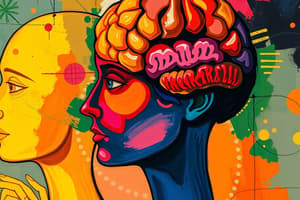Podcast
Questions and Answers
Which of the following definitions best captures the essence of love?
Which of the following definitions best captures the essence of love?
- An obligation that one feels towards close relationships.
- A temporary emotional state often related to physical attraction.
- A purely psychological phenomenon with no emotional component.
- A feeling of deep affection and attachment. (correct)
Which psychological theory most closely examines the components of love?
Which psychological theory most closely examines the components of love?
- Sternberg's triangular theory of love. (correct)
- Cognitive dissonance theory.
- Maslow's hierarchy of needs.
- Behaviorism's reinforcement theory.
What role do cultural differences play in the perception of love?
What role do cultural differences play in the perception of love?
- They standardize the definition of love across all societies.
- They only affect romantic love, not familial love.
- They shape the expectations and expressions of love. (correct)
- They have no significant impact on how love is perceived.
Which biological theory describes love as an evolutionary mechanism?
Which biological theory describes love as an evolutionary mechanism?
Which neurological process is primarily associated with feelings of love?
Which neurological process is primarily associated with feelings of love?
Flashcards are hidden until you start studying
Study Notes
Definitions and Theories of Love
- The essence of love is often defined by characteristics such as affection, attachment, and a deep emotional connection with someone.
- Robert Sternberg's Triangular Theory of Love examines love through three components: intimacy, passion, and commitment, which interact to form different types of love experiences.
Cultural Perspectives on Love
- Cultural differences greatly influence how love is perceived and expressed, affecting relationship dynamics and communication.
- In some cultures, love may be viewed more as a collective or familial obligation, whereas others may emphasize individual romantic love as a personal choice.
Biological and Evolutionary Insights
- The biological theory of love suggests that love serves as an evolutionary mechanism, enhancing pair bonding and ensuring the survival of offspring.
- Evolutionary psychologists argue that romantic love has developed as a way to promote long-term relationships and mutual support in raising children.
Neurological Aspects of Love
- Feelings of love are primarily associated with the release of neurotransmitters such as oxytocin, dopamine, and vasopressin, which impact bonding and pleasure.
- The brain's reward system activates during romantic interactions, reinforcing feelings of attachment and desire.
Studying That Suits You
Use AI to generate personalized quizzes and flashcards to suit your learning preferences.




